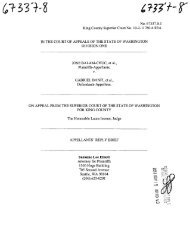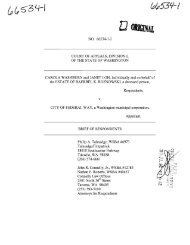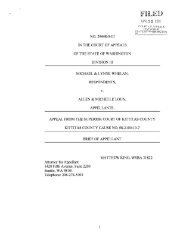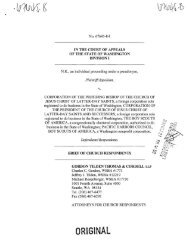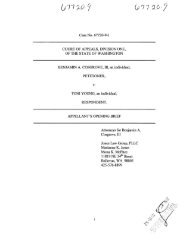Appellant's Brief - Washington State Courts
Appellant's Brief - Washington State Courts
Appellant's Brief - Washington State Courts
You also want an ePaper? Increase the reach of your titles
YUMPU automatically turns print PDFs into web optimized ePapers that Google loves.
a crime, they did not suspect, let alone believe, that there was a<br />
drug operation being conducted in the bedroom of the trailer. In his<br />
brief, at page 15, Mr. Smith acknowledges that the officers had no<br />
information that would indicate any suspects were in the trailer<br />
when they entered; there is no indication of any ulterior motive for<br />
the search. The officers went there to see that Briggs got safely<br />
home. Officer Lindros would have likely called paramedics had<br />
other officers at the scene not been familiar with Briggs and knew<br />
that intoxication was his normal state. (1123106 RP, pgs. 31-32)<br />
<strong>Courts</strong> are to be cautious in applying the community<br />
caretaking function because of the risk of abuse even when the<br />
original intention is good. "'The noncriminal investigation must end<br />
when reasons for initiating the encounter are fully dispelled."' <strong>State</strong><br />
v. Moore, 129 Wn. App. 870, 879, 120 P.3d 635 (2005). In the<br />
case before this court, Officers Anderson and Lindros were<br />
concerned that there might be another person in the trailer who<br />
would not have Harold Briggs' best interests at heart. Officer<br />
Anderson looked into the bathroom and the bedroom, intruding only<br />
long enough to determine that no one was there. The brevity of her<br />
search is underscored by the fact that someone was there and she<br />
failed to see him. (I123106 RP, p. 65) Almost immediately, Harold



